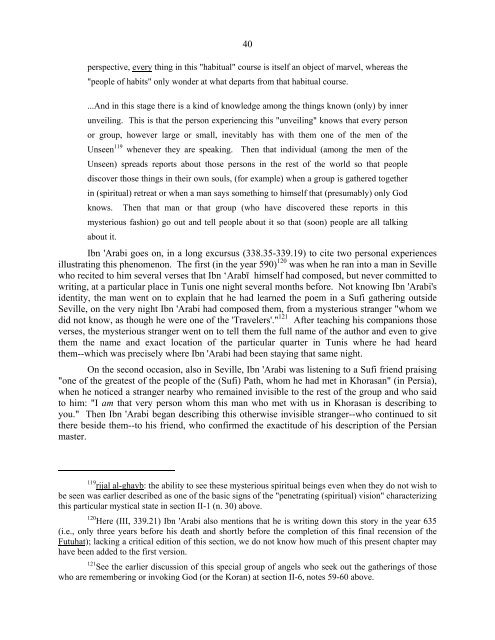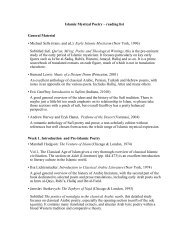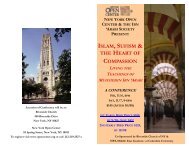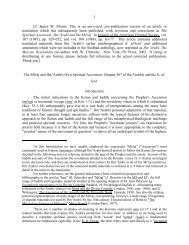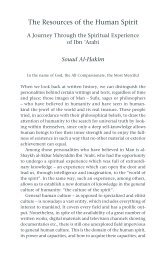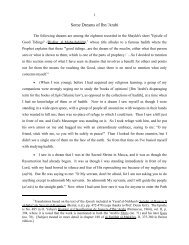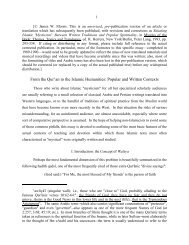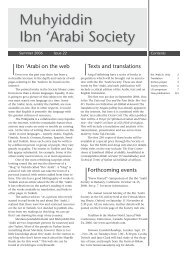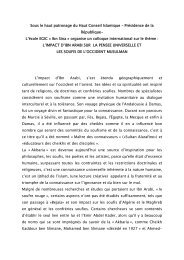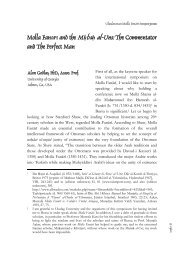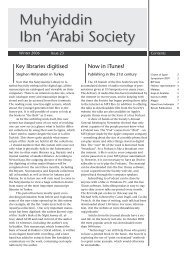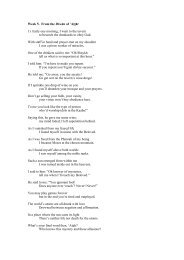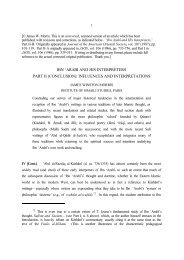The Mahdi and His Helpers - Muhyiddin Ibn Arabi Society
The Mahdi and His Helpers - Muhyiddin Ibn Arabi Society
The Mahdi and His Helpers - Muhyiddin Ibn Arabi Society
Create successful ePaper yourself
Turn your PDF publications into a flip-book with our unique Google optimized e-Paper software.
40perspective, every thing in this "habitual" course is itself an object of marvel, whereas the"people of habits" only wonder at what departs from that habitual course....And in this stage there is a kind of knowledge among the things known (only) by innerunveiling. This is that the person experiencing this "unveiling" knows that every personor group, however large or small, inevitably has with them one of the men of theUnseen 119 whenever they are speaking. <strong>The</strong>n that individual (among the men of theUnseen) spreads reports about those persons in the rest of the world so that peoplediscover those things in their own souls, (for example) when a group is gathered togetherin (spiritual) retreat or when a man says something to himself that (presumably) only Godknows. <strong>The</strong>n that man or that group (who have discovered these reports in thismysterious fashion) go out <strong>and</strong> tell people about it so that (soon) people are all talkingabout it.<strong>Ibn</strong> '<strong>Arabi</strong> goes on, in a long excursus (338.35-339.19) to cite two personal experiencesillustrating this phenomenon. <strong>The</strong> first (in the year 590) 120 was when he ran into a man in Sevillewho recited to him several verses that <strong>Ibn</strong> ‘Arabī himself had composed, but never committed towriting, at a particular place in Tunis one night several months before. Not knowing <strong>Ibn</strong> '<strong>Arabi</strong>'sidentity, the man went on to explain that he had learned the poem in a Sufi gathering outsideSeville, on the very night <strong>Ibn</strong> '<strong>Arabi</strong> had composed them, from a mysterious stranger "whom wedid not know, as though he were one of the 'Travelers'." 121 After teaching his companions thoseverses, the mysterious stranger went on to tell them the full name of the author <strong>and</strong> even to givethem the name <strong>and</strong> exact location of the particular quarter in Tunis where he had heardthem--which was precisely where <strong>Ibn</strong> '<strong>Arabi</strong> had been staying that same night.On the second occasion, also in Seville, <strong>Ibn</strong> '<strong>Arabi</strong> was listening to a Sufi friend praising"one of the greatest of the people of the (Sufi) Path, whom he had met in Khorasan" (in Persia),when he noticed a stranger nearby who remained invisible to the rest of the group <strong>and</strong> who saidto him: "I am that very person whom this man who met with us in Khorasan is describing toyou." <strong>The</strong>n <strong>Ibn</strong> '<strong>Arabi</strong> began describing this otherwise invisible stranger--who continued to sitthere beside them--to his friend, who confirmed the exactitude of his description of the Persianmaster.119 rijal al-ghayb: the ability to see these mysterious spiritual beings even when they do not wish tobe seen was earlier described as one of the basic signs of the "penetrating (spiritual) vision" characterizingthis particular mystical state in section II-1 (n. 30) above.120 Here (III, 339.21) <strong>Ibn</strong> '<strong>Arabi</strong> also mentions that he is writing down this story in the year 635(i.e., only three years before his death <strong>and</strong> shortly before the completion of this final recension of theFutuhat); lacking a critical edition of this section, we do not know how much of this present chapter mayhave been added to the first version.121 See the earlier discussion of this special group of angels who seek out the gatherings of thosewho are remembering or invoking God (or the Koran) at section II-6, notes 59-60 above.


